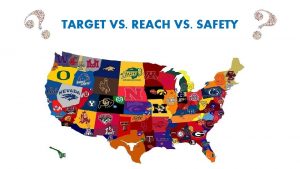NATIONAL ASSOCIATION OF DEANS AND DIRECTORS OF SCHOOLS














- Slides: 14

NATIONAL ASSOCIATION OF DEANS AND DIRECTORS OF SCHOOLS OF SOCIAL WORK Research Plenary Jack M. Richman, Ph. D. Dean, School of Social Work University of North Carolina at Chapel Hill San Antonio, Texas FALL CONFERENCE September 17, 2005

Model for Evidence-Based Practice Decisions Clinical State & Circumstances Clinical Expertise Client’s Preferences & Actions Source: Haynes, Devereaux, and Guyatt Research Evidence

Intervention Research Stakeholders – Practice • Practitioner – Recognize the importance of social intervention research & data driven practice. – Have knowledge needed to implement evidence supported practices. – Have time and technology available to engage in process of research review and synthesis.

Intervention Research Stakeholders – Practice • Client system – Client concerns, values, goals & preferences – Client situation, circumstance, strengths, culture, ethnicity, and support systems

Intervention Research Stakeholders – Practice • Agency – Agency as a learning organization willing to engage in and support the process of data driven practice. – Maintain a team of supervisors & practitioners who support & engage in creative dialogue & clinical implementation informed by social intervention research & data. – Provide available time & technology to implement social intervention research.

Intervention Research Stakeholders – Practice • Macro delivery system – Administrative systems & funding sources must support the intersecting roles of intervention, research, & practice. – Administrative systems & funding sources must support the research & practice activities & resulting time obligations. – Implications of privatizing mental health service delivery in some states – no reimbursement for research or practice that does not fit with State definition of EBP.

Intervention Research Stakeholders – University • Curriculum – Teach the integration of social intervention research, data-driven practice, and clinical skills expertise. – Teach the practice strategies that are supported by data (e. g. , cognitive behavioral therapy, family psycho-education, social skills training, multisystemic family therapy, DBT). – Teach methods that are critical to implementation – (group work, home visitation)

Intervention Research Stakeholders – University • Knowledge creation and dissemination – Publications and presentations – Tenure and promotion requirements • Research design issues – smaller sample size – requires relationship development with agencies and/or clients, prior consent, complicated IRB issues, and language issues. – Possible lack of control groups, the inability to withhold treatment or services to clients, nonrandomized samples, intersectionality, etc.

Reimbursable Evidence-Based Practice Treatments in Adult Mental Health • • • Assertive Community Treatment Illness Management and Recovery Medication Management Family Psycho-Education Supported Employment Co-occurring Disorders: Integrated Dual Disorders Treatment

Operationalizing Approved EBP Skills in Adult Mental Health • Help with social and family relationships • Crisis management • Counseling & psycho-education with family & extended family • Coordination with family service agencies • Help to find volunteer and vocational opportunities • Provide liaison with and education employers • Serve as job coach for consumers • Provide preventive health education • Conduct medical screening • Provide reproductive counseling and sex education

Operationalizing Approved EBP Skills in Adult Mental Health • • • Provide education about medication Monitor medication compliance and side effects Secure leases and pay rent Purchase and repair household items Develop relationships with landlords Improve housekeeping skills Financial management Counseling Use problem-oriented approach Integrate counseling into continuous work

Other Reimbursable EBP Treatments in Mental Health • • • Child Mental Health Multisystemic Therapy Intensive In-home Services Substance Abuse Cognitive Behavioral Treatment (CBT) Medication Assisted Treatment (Methadone, LAAM, Buprenorphine). • Motivational Enhancement Therapy (MET)

Models for Social Intervention Research • Practitioner – Scientist – Schools teach practitioners the ability to understand implement research in the practice arena. • University/Agency Partnership – University faculty and agency practitioners partner to work on intervention research. • Agency Research Unit – Unit provides the resources to hire a full time intervention research specialist.

Future of Intervention Research • Quantity of intervention research. • Quality of intervention research. • Recognition of importance of intervention research by stakeholders. • Collaboration in engaging in intervention research. • Inclusion in university curriculum • Don’t lose critical nature of clinical expertise and practice wisdom,
 National association of deans and directors
National association of deans and directors National association of state medicaid directors
National association of state medicaid directors Astdd
Astdd Thai institute of directors association
Thai institute of directors association Colorado medical directors association
Colorado medical directors association Cc: all deans and heads
Cc: all deans and heads Lingual vestibuloplasty
Lingual vestibuloplasty Deans community high school
Deans community high school Ohio deans compact
Ohio deans compact Deans pest control
Deans pest control Dean fluorosis index
Dean fluorosis index Mylohyoid ridge
Mylohyoid ridge Scottish council of deans of education
Scottish council of deans of education Ncat deans list
Ncat deans list Safety target and reach schools
Safety target and reach schools



























